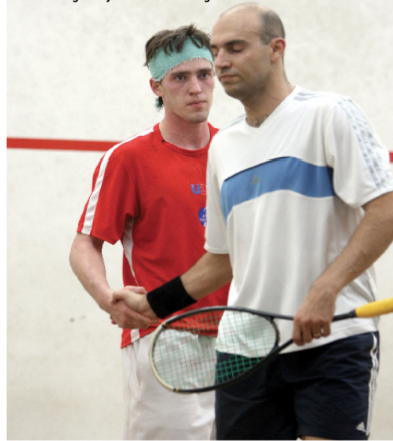By Richard Millman, Director of Squash, Kiawah Island Club
Ifyou enter a tournament, you are committed for the whole weekend. Don’t organize other events that you are committed to attending. It doesn’t matter whether it’s church, a soccer game, a birthday party or a house closing—don’t do it! If you travel away to a tournament you spend the whole weekend at the tournament—so do the same if you enter a local tournament. Or don’t enter. Anything less is simply rude. Rude to the other players whose time you are abusing, rude to the organizer who has plenty to do without having to arrange logistics around your personal needs. If you tell the organizer in advance and they can accommodate you—then that’s not so bad—but don’t expect it.
If you wake up sick: Call the tournament, let them know immediately and get the opponent’s phone number and call them to apologize for letting them down. It’s not good enough just to tell the tournament organizer.

If you don’t feel like playing: You have a responsibility—get going and play!
Refereeing: Volunteer! That’s right…offer; don’t try and sneak off. If you have had a tough match and you have another one coming up, it’s OK to find a substitute, but it’s your responsibility, not the organizer’s. If you don’t fulfill that responsibility you should be disqualified.
If you do referee: Do so with impartiality. I don’t know if the situation has changed, but when I last watched competitive, intense intercollegiate matches, I was often embarrassed. The corrupted version of refereeing that they were using was tantamount to tacit acceptance/encouragement of cheating—where one player from each team can effectively nullify a decision from the other team along partisan lines. It is no sort of refereeing system. We should teach our players to take pride in impartiality and they should have the courage to make the right decision. Someone somewhere seems to have propounded the notion that players refereeing for their own teams are incapable of honesty. This is nonsense. If we teach our players to take pride in impartial refereeing, they will feel better about themselves and our sport will be judged favorably by history’s ever-scrupulous lens. One marker and one referee is the right way or possibly three referees for Pro matches, but never two referees who can cancel each other out. How can we expect our young players to maintain integrity in their adult lives, if we encourage partisan bias in their youth? Are we trying to groom for future Enron type crises?
Team Matches:
If you agree to play, you should be there for the whole match—not just your match. And every match should be refereed. Leagues where matches aren’t refereed are honestly a joke. They disintegrate into a free-for-all where squash is the loser. Rules are there for a reason.
When the match is over:
In regular club play: If your court time is over, don’t ask the players waiting outside to wait until the end of the game. If your time is over, their time is beginning. Don’t steal their time.
At the end of the match: Always shake your opponent’s hands and look them in the eye. And don’t give a limp handshake. There’s nothing as insincere as a limp handshake from an opponent that won’t look you in the eye. You may be disappointed in losing, but don’t ruin your opponent’s moment of success. Tell them ‘Well played!’ and move on.
If it is an official match and there is a referee, shake the referee’s hand as well!
In summary:
Ours should not be a confrontational sport. Where we see players challenging referees and opponents in an inflammatory manner, we see a lack of training or coaching and guidance. We don’t want the poor sportsmanship of soccer and baseball confrontations.
Football and Rugby, two of the most physical and confrontational sports we know, have found a way of making officialdom a respected pursuit.
Squash should be the leader in the racquet sport world and, in order to lead, we have to start both at the grass roots and the top and find a way of meeting in a respectable middle.
So start saying ‘Let, please’ instead of ‘Let!’ Don’t hit the ball to yourself 10 times in the warm up, and don’t let your kids and friends do it. Volunteer to referee. Above all adhere to the rules—particularly in regard to wearing eyewear in US Squash competitions. Don’t flout the rules. Do you realize how many kids see you not wearing eyewear and that you’re responsible for making them think it’s cool not to wear eyewear? Is that what you want? Do you know the extent of the reduction in eye injuries since eyewear has become mandatory? Find out—you’ll be amazed.
Be polite and you will feel proud of both your method of play and of our sport. Start now. We need all of us to contribute if we are to root out some of the seedy behavior that has both knowingly and unwittingly crept in.
Next month: Peaking for performance—get sharp for the big match.


